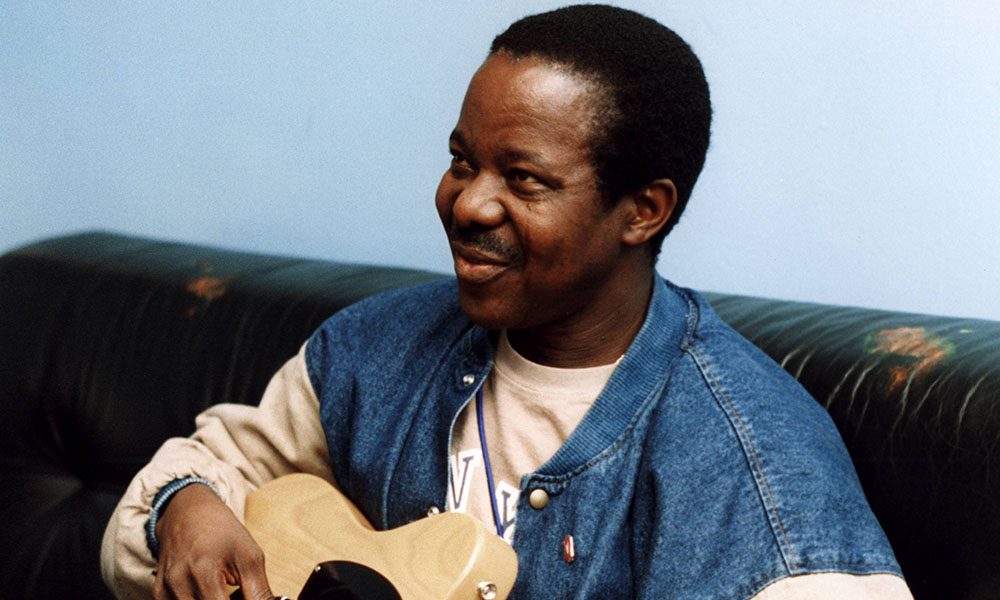‘Juju Music’: King Sunny Adé Introduces A Nigerian Genre To The World
The album ‘Juju Music’ was the first of its kind, and opened the floodgates for other artists from Africa to go global.

King Sunny Adé wasn’t supposed to make music. Born Sunday Adéniyi Adégeye on September 22, 1946 to a royal family from Ondo and Akure, the profession was far outside of what was expected from Nigerian royalty. Yet, the Nigerian national treasure became an international star and elevated African pop music to new heights.
How the singer, songwriter, and multi-instrumentalist got there is a complicated story. Many view the release of his 1982 album Juju Music as his (and modern African music’s) ascendant moment. But Island Records didn’t pluck him out of obscurity. Before Juju Music’s release, Adé was already an established force in Nigeria, with his own record label and his own nightclub. He performed live shows consistently and released up to four albums a year, amassing a catalog already filled with dozens of albums.
Listen to King Sunny Adé on Apple Music and Spotify.
The untimely death of Bob Marley in 1981 prompted Island Records founder Chris Blackwell to search for an “It-international star” replacement. King Sunny Adé and Bob Marley, however, were two different kinds of artists— from genres to messaging, style, and origin —even if, in the eyes of the Western music industry, they were of the same cloth. This flawed view rendered all international Black music the same, slotting it into the highly-contentious “world music” category.
Jùjú Music in Nigeria
Perhaps sensing this, Adé named the album specifically after the genre of music he was playing. When he was growing up, jùjú had primarily been folk and social music defined by Yoruba drums and vocals. After highlife music, juju became the popular, dominant sound in Nigeria during the second half of the 20th century. Derived from traditional Yoruba percussion, jùjú music was believed to have been created by musician AbdulRafiu Babatunde King, known as Tunde King. Along with pioneering musicians like Adéolu Akinsanya, Ayinde Bakare, Dele Ojo, Ebenezer Obey, Fatai Rolling Dollar, I. K. Dairo, and his main influence, Tunde Nightingale, Adé played the pivotal role in making jùjú popular both in and outside Nigeria.
“The name has been given to my kind of music by the colonists,” he told NYC Radio Live. Though the name comes from the Yoruba word “jùjú” or “jiju” meaning “throwing,” British colonists in Nigeria called the sounds they were hearing from various groups jùjú. What they didn’t understand was, he noted, “It’s a free sound.” This pillar of the genre gave Adé the license to experiment.
The predominant instrument of jùjú was the Iya Ilu, or “talking drum.” Adé innovated by introducing the pedal steel guitar to the music. In an Afropop Worldwide podcast, Nigerian poet and cultural commentator Odia Ofeimun explains that “Sunny Adé was special because he had a commitment to an instrument, the guitar, which made all the difference… Even if you didn’t understand the Yoruba language, you got into the stream of those guitar strings… He was a new kind of jùjú musician.”
Alongside his guitar work, Adé is one of Nigeria’s greatest wordsmiths. Part of what made him a singular force in jùjú was his fluency in proper Yoruba and modern slang. Before he spoke to a global audience, he had already mastered how to speak to (and for) his own, in a country of people disconnected by tribe and language and bound by borders and cultural exchanges. It’s no small feat to make music that becomes a joining force for all Nigerians.
Juju Music, The Album
All of this history was brewing underneath the sound Western audiences initially heard with his first worldwide release. Recorded with his African Beats band, Juju Music was composed of prior songs Adé had released in Nigeria. Adé partnered with French producer, Martin Meissonnier, who advised that the long song structures of Nigerian music would not work for Western audiences. So, Adé abridged a number of his Nigerian hits, making them more digestible for international release. Non-stop recording that would typically result in 15 to 20-minute songs was shortened and reworked.
At roughly eight minutes, “365 Is My Number/The Message” stands as the longest song on the album and is the only track titled in English. It features an elongated dance-break, familiar to the style of isolated instrumentation in the drum breaks employed by pioneering hip-hop DJs. It’s accompanied by the beloved classic “Ja Funmi”– an anthem Adé has continued to perform. Translating to “fight for me,” “Ja Funmi” sees Adé flip the common phrase into a loaded metaphor he’s explained as, “You use your head to represent your God.” The weight of his words compounded with his convivial compositions made for music full of as much meaning as movement.
When it was released, Juju Music became subject to the misnaming and misunderstanding of Western listeners. The New York Times claimed the album was “the year’s freshest dance-music album,” later crediting it as having launched the “World Beat movement in the United States.” Tucson Weekly described Island’s marketing of Adé as “a monumental juncture in the exposure and development of world beat music; perhaps the first time a major American imprint had fully endorsed an African-derived music that was not reggae,” dubbing him, “king of the World Beat.”
Many were eager to compare King Sunny Adé to another famous Nigerian musician. The year of Juju Music’s release, the New York Times’ Robert Palmer wrote, “American listeners usually expect pop music from the underdeveloped nations to sound angry and militant, but Sunny Adé’s music sounds sweet and cool.” The “angry and militant” descriptor was, of course, referencing Fela Kuti’s Afrobeat. In the 1970’s, exciting music and artists were emerging in Nigeria. Kuti’s pioneering Afrobeat served as an artistic opposition to Nigeria’s military regime and the ruling elite. It was confrontational opposition music. It was the people’s music.
King Sunny Adé, meanwhile, was taking prominence as a leader in the (already existing) jùjú music. It was never political in the same way as Afrobeat; it was social, folk, and everyday. Adé’s Juju Music wasn’t a “sweet” alternative to Fela’s movement music contending with harsh realities. It was a part of that reality; another angle of the same nation with artistic expressions in abundance. Adé’s artistry isn’t estimable because jùjú music didn’t challenge Western audiences with discomfort and staunch political leanings. He didn’t serve to appease Western audiences with a counter offering; he expanded upon what was an organic, traditional sound that represented his people’s feel-good music, laced with traditional proverbs and packed with profundity.
Juju Music was the first of its kind and opened the floodgates for other artists from the continent to go global. Adé’s role with this international release was to continue communicating his culture to his people in old and new ways and to speak to the souls of everyone else. King Sunny Adé and Juju Music did as much – if not more – for the Western music scene than the reverse.
This article was first published in 2020. We are republishing it today, in celebration of King Sunny Ade’s birthday. Black Music Reframed is an ongoing editorial series on uDiscover Music that seeks to encourage a different lens, a wider lens, a new lens, when considering Black music; one not defined by genre parameters or labels, but by the creators. Sales and charts and firsts and rarities are important. But artists, music, and moments that shape culture aren’t always best-sellers, chart-toppers, or immediate successes. This series, which centers Black writers writing about Black music, takes a new look at music and moments that have previously either been overlooked or not had their stories told with the proper context.












